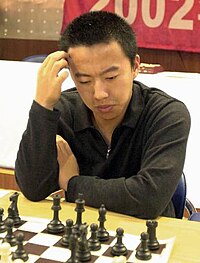The Chinese Xiangqi Association (CXA) has issued lifetime bans for Wang Tianyi and Wang Yuefei, two of the game’s top-ranked players, for match-fixing and taking bribes.
According to reports in local press, an investigation carried out by the CXA found that both players had ‘bought and sold’ games over a prolonged period of time. No exact dates were given for any of the alleged violations nor were the details of the matches under investigation disclosed.
Both players have been banned from taking part in any events that are organized or sanctioned by the CXA or its affiliates. They were also stripped of their titles as grandmasters of Chinese chess.
The CXA also noted that it continues its work alongside the General Administration of Sport and other authorities to further investigate the violations and ensure that both players are punished to the full extent of the law.
Wang Tianyi became the 16th national champion in 2012 and had been the top-ranked Chinese Xiangqi player since 2014.
Wang Tianyi, born in 1989, became the 16th national champion in 2012 and had held the top spot in the Chinese Xiangqi rankings for over a decade since 2014.
Wang Yuefei was runner-up in the 2010 national championships became a grandmaster in 2013.
Both players were teammates on the Hangzhou team from Zhejiang province, which won the Xiangqi league title in 2023.
Recording of Match-Fixing Conversation Surfaces Online
In April of 2023, an apparent recording of a conversation between Wang Yuefei and fellow grandmaster Hao Jichao was released online. During the conversation the pair were heard discussing match-fixing involving Wang Tianyi and Wang Yuefei.
While the recording led to widespread condemnation of the players, the CXA made no comment at the time.
However, in June it was reported that Wang Tianyi was under police investigation in Hangzhou. In August, it was revealed that he had been arrested for alleged criminal violations. The police have yet to issue any statements in relation to the case.
Latest in Series of High-Profile Match-Fixing and Cheating Scandals in China
The CXA bans are the latest in a string of match-fixing allegations that have rocked China.
In December of 2023, the CXA revoked the title of “Xiangqi King” from Yan Chenglong following his disruptive behavior after his win. The CXA was also forced to address rumors that the player had used anal beads to communicate with a computer during his game to in order to gain an advantage. At the time the CXA stated that the alleged cheating was ‘impossible to prove’.
In April 2023, the Shanghai Sharks and Jiangsu Dragons were found to have deliberately acted in a way to influence the outcome of their game in the opening round of the 12-team CBA playoffs. In the three-game series, Jiangsu, leading 100-96 late in the game, conceded multiple turnovers, leading Shanghai to win 108-104. Both teams were disqualified for the season, and fined 5 million yuan ($727,000).
Earlier in June 2023, professional snooker players Liang Wenbo and Li Hang were given lifetime bans for match-fixing while another eight players were given long suspensions for their involvement.
In September of 2024, The Chinese Football Association (CFA) announced that 43 players were banned from football for life for their alleged roles in match fixing. According to the CFA, the list of banned people includes three former China international players – Jin Jingdao, Guo Tianyu and Gu Chao –and South Korean player Son Jun-ho.
In a shocking turn of events, several Chinese chess players have been handed lifetime bans for their involvement in match-fixing scandals. The Chinese Chess Association (CCA) announced the bans after an investigation uncovered evidence of players deliberately throwing matches in exchange for money.
The CCA has a zero-tolerance policy towards cheating and match-fixing in chess, and these bans serve as a strong deterrent to other players who may be tempted to engage in similar behavior. Match-fixing not only undermines the integrity of the game but also damages the reputation of the players and the sport as a whole.
The banned players have not been named publicly, but it is believed that they were involved in manipulating the outcomes of high-stakes matches in order to profit from illegal betting activities. This kind of behavior is not only unethical but also illegal, and the CCA is taking a firm stance against those who seek to tarnish the reputation of Chinese chess.
The lifetime bans handed down to these players send a clear message that cheating will not be tolerated in the world of chess. The CCA is committed to upholding the principles of fair play and sportsmanship, and will continue to take strong action against those who violate these principles.
In addition to the lifetime bans, the CCA has also implemented stricter measures to prevent future incidents of match-fixing. These measures include increased monitoring of players and matches, as well as harsher penalties for those found guilty of cheating.
Overall, the actions taken by the CCA serve as a reminder that integrity and honesty are paramount in the world of chess. Cheating not only harms the players involved but also damages the reputation of the sport. By cracking down on match-fixing, the CCA is sending a clear message that cheating will not be tolerated, and that fair play is essential in maintaining the integrity of Chinese chess.



